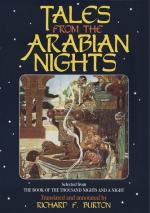[FN#56] Scott introduces (p. 262), “the tyrant, struck with his magnanimity, became calm, and commanding the executioner to release the youth, said, For the present I forbear, and will not kill thee unless thy answers to my further questions shall deserve it. They then entered on the following dialogue: Hyjuawje hoping to entrap him in discourse.”
[FN#57] See the dialogue on this subject between Al-Hajjaj and Yahya ibn Yamar in Ibn Khallikan, iv. 60.
[FN#58] Surah xxxiii. (The Confederates), v. 40, which ends, “And Allah knoweth all things.”
[FN#59] Surah lix. (The Emigration), v. 40: the full quotation would be, “The spoil, taken from the townsfolk and assigned by Allah to His Apostle, belongeth to Allah and to the Apostle and to his kindred and to the orphan and to the poor and to the wayfarer, that naught thereof may circulate among such only of you as be rich. What the Apostle hath given you, take. What he hath refused you, refuse. And fear ye Allah, for Allah is sure in punishing.”
[FN#60] The House of Hashim, great-grandfather to the Prophet.
[FN#61] Ibn Khallikan (vol. i. 354) warns us that “Al-Tai” means belonging to the Tai which is a famous tribe. This relative adjective is of irregular formation; analogy would require it to be Taii; but the formation of relative adjectives admits some variations; thus from dahr (time) is derived duhri (temporal) and from sahl (a plain), suhli (plain, level). The author might also have told us that there is always a reason for such irregularities; thus “Dahri” (from Dahr) would mean a Mundanist, one who believes in this world and not the next or another.
[FN#62] The “Banu Thakif” was a noble tribe sprung from Iyad (Ibn Khallikan i. 358-363); but the ignorant and fanatic scribe uses every means, fair and foul, to defame Al-Hajjaj. It was a great race and a well known, living about Taif in the Highlands East of Meccah, where they exist to the present day. Mr. Doughty (loc. cit. ii. 174) mentions a kindred of the Juhaynah Badawin called El-Thegif (Thakif) of whom the Medinites say, “Allah ya’alan Thegif Kuddam takuf” (God damn the Thegif ere thou stand still). They are called “Yahud” (Jews), probably meaning pre-Islamitic Arabs, and are despised accordingly.
[FN#63] In Arab. “Jady” = the Zodiacal sign Capricorn.
[FN#64] We find similar facetia in Mullah Jami (Garden viii.). When a sheep leapt out of the stream, her tail happened to be raised, and a woolcarder said laughing:—“I have seen thy parts genital.” She turned her head and replied, “O miserable, for many a year I have seen thee mother-naked yet never laughed I.” This alludes to the practice of such artisans who on account of the heat in their workshops and the fibre adhering to their clothes work in naturalibus. See p. 178, the Beharistan (Abode of Spring). Printed by the Kamashastra Society for Private Subscribers only. Benares, 1887.




